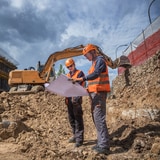BS 99001:2022 Creating a new standard to tackle quality assurance in the built environment
ISO 9001 is a well-established and popular quality management system standard, but for the built environment sector it falls short of what’s needed. This blog post explores why that’s the case and how the sector has addressed this deficit with the creation of a new sector-specific quality management standard.
For many years, ISO 9001 has been the world’s best-selling standard. It’s a generic standard - hence it’s wide appeal - and covers how to implement a quality management system in organizations of any size or type. However, for the built environment sector, it has never been entirely satisfactory.
This partly stems from the fact that ISO 9001 is geared towards organizational quality systems. The built environment sector, meanwhile, is very much project-based. The feeling is that projects themselves need an effective quality management system to ensure sufficient quality assurance at all stages, from conception and design to decommissioning or demolition of built assets. And ISO 9001 doesn’t offer that.
A second drawback is that ISO 9001 is so generic that it doesn’t penetrate deeply enough into the areas where the built environment most needs quality to be managed. Specific known areas of concern include a propensity for cost to be put above quality, and sometimes insufficient resource is allocated to ensure quality is checked effectively at required stages, giving rise to safety concerns.
For these reasons, ISO 9001 has been deemed not wholly adequate for the sector’s unique needs. And that perception has fuelled a strong desire in the industry for a new sector-specific quality standard. This has now arrived in the form of BS 99001:2022 Quality management systems – specific requirements for the built environment sector.
Consolidated thinking
BS 99001:2022 is a new British Standard that supplies additional sector-specific management system requirements that are intended to tackle specific areas of concern in a multi-organizational, project-based way of working. The intention is that it be used alongside ISO 9001 to supplement that standard.
BS 99001:2022 has also been written very much by and for the sector. This is partly because in the past few years many different bodies have developed their own schemes or documents to try and deal with the identified failings. This has produced a fragmented picture that leaves many people not really knowing which route to choose. By bringing as many of these industry players as possible to the table, BS 99001:2021 has been able to synthesize and consolidate their thinking and expertise. Importantly it means that the resulting standard will also enable more cohesion in the sector which is needed to really make a difference.
The standard has also been developed quickly because it’s felt there’s an urgent need for it. As a result, its development has been accelerated, with committee members being encouraged to share drafts widely to get as much input as possible in the earliest stages. Additionally, three major organizations piloted the standard early – during the publication consultation stage – to iron out any wrinkles. One of these also worked with a smaller contractor on a pilot to test the standard’s suitability for smaller organizations and for cascading through the supply chain.
Anticipated benefits
BS 99001:2022 is written for the whole sector: that includes designers, architects, construction organizations at all tier levels and contractors. It also covers structural engineers, skilled tradespeople (e.g. bricklayers, carpenters, roofers), project managers, raw materials suppliers (cement, concrete, timber, etc.) and surveyors. It takes in decommissioning and recycling experts and manufacturers who prefabricate for the industry.
The advantage of using it will be that it supplies a tool that everyone can engage with to achieve sector-wide improvements in the fundamental suitability, safety and durability of built assets.
In addition, the hope is that it will contribute towards helping rebuild trust and confidence in the industry as a whole. And for individual firms, it gives them a mechanism whereby they can convincingly demonstrate their commitment to providing a high level of quality assurance on projects, along the supply chain and in their day-to-day operations. In addition, this new standard should help them develop their expertise with, and efficiency in, project-based quality management.
If you already have a copy of BS EN ISO 9001, then you can simply purchase your copy of BS 99001 to use alongside it. Alternatively, you can purchase PD 99001 - a single document containing all the clauses of BS EN ISO 9001 followed in turn by the respective clause content from BS 99001.
If you do not have either BS EN ISO 9001 or BS 99001, then you can purchase both documents separately if that is your preference. Or you can purchase PD 99001 if you wish to have all the requirements in a single document.




